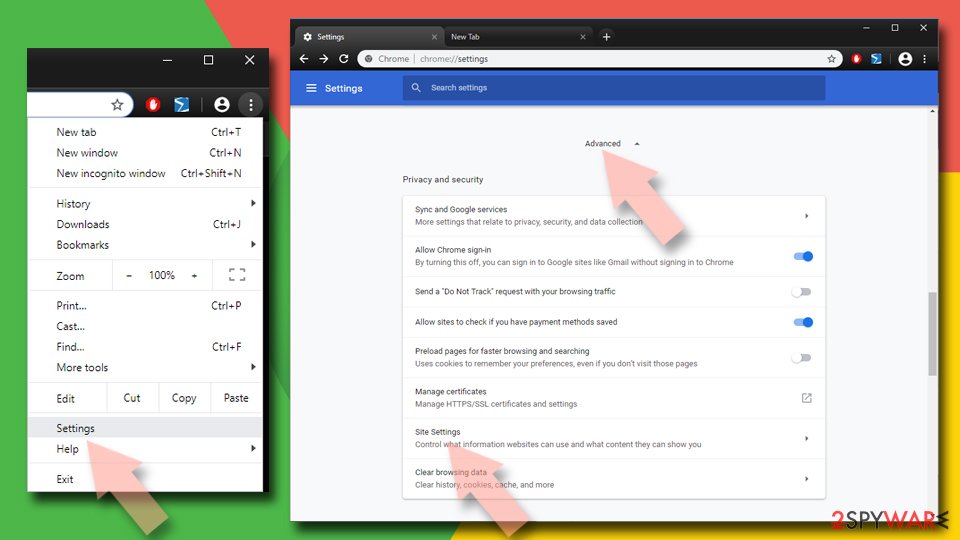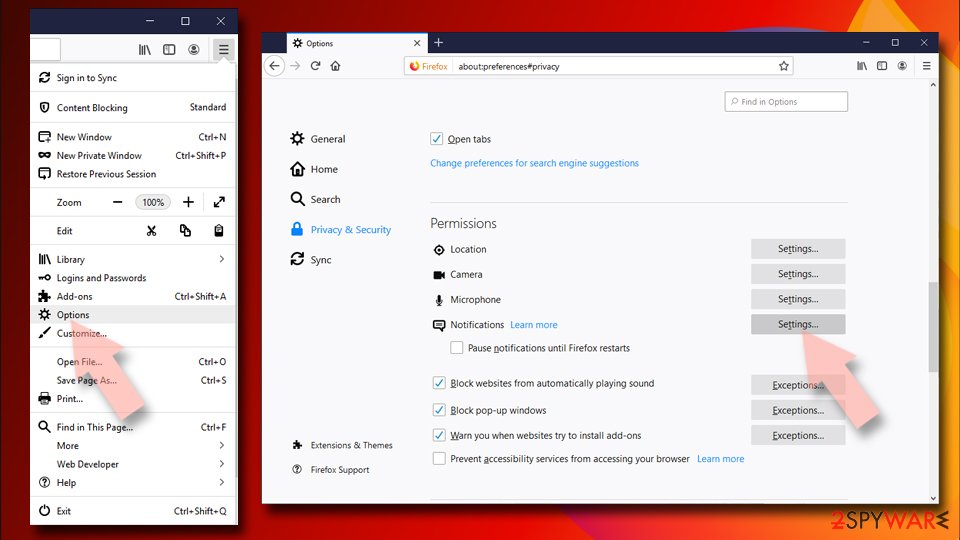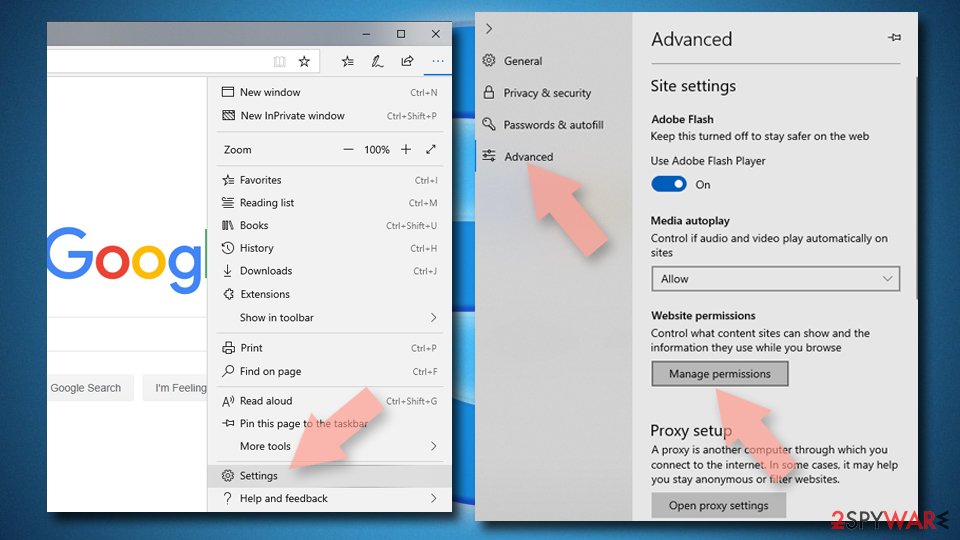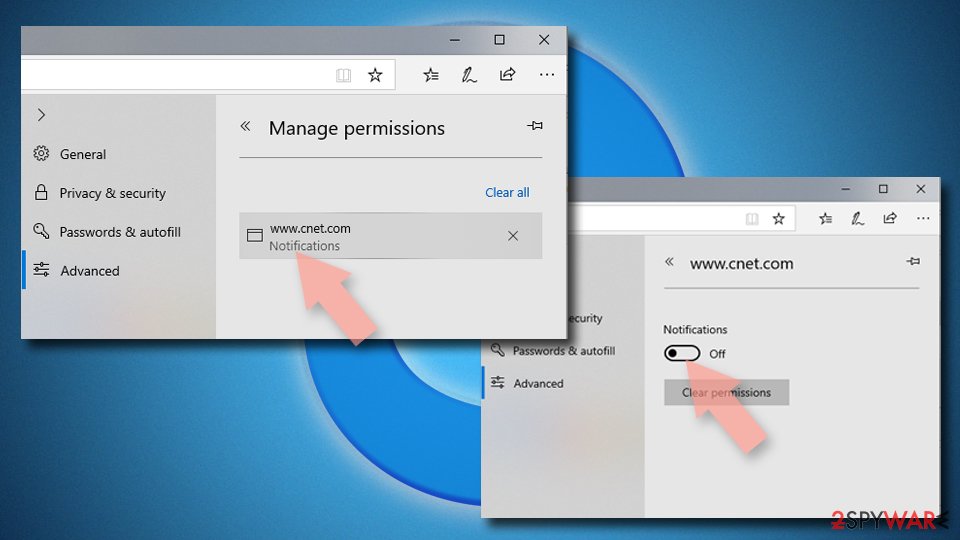Uponwarmth.com ads (scam) - Free Guide
Uponwarmth.com ads Removal Guide
What is Uponwarmth.com ads?
Uponwarmth.com is a fake site created by crooks to generate revenue from pop-ups
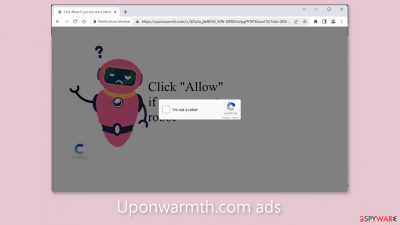
Uponwarmth.com is one of many websites created by scammers to profit from user activity. They use social engineering[1] to trick people into subscribing to push notifications, convincing them that they must click the “Allow” button to prove they are not robots.
Users, however, unwittingly subscribe to push notifications and begin receiving annoying pop-up ads that may even appear when the browser is closed. These criminals may use rogue advertising networks to place advertisements that lead to dangerous websites.
As a result, users may end up on scam sites that try to steal their personal information or trick them into downloading PUPs (potentially unwanted programs)[2] or malware. Apart from the misleading message and image, there is nothing else to explore on this website. We recommend that you disable the pop-ups immediately.
Distribution methods
People frequently come across pages like Uponwarmth.com while browsing dubious websites. These pages typically engage in illegal activities, such as illegal streaming sites,[3] which are unmonitored and thus filled with deceptive ads and redirects.
Adware – advertising-supported software that generates commercial content such as pop-ups, banners, and redirects – can occasionally be blamed for the presence of scam pages. It runs in the background, leaving most users perplexed as to why they are suddenly experiencing this unwanted behavior.
| NAME | Uponwarmth.com |
| TYPE | Push notification spam; adware |
| SYMPTOMS | Pop-up ads start appearing in the corner of the screen sometimes even when the browser is closed |
| DISTRIBUTION | Shady websites; deceptive ads; freeware installations |
| DANGERS | The pop-ups can expose people to inappropriate content like adult, gambling sites, and even scams |
| ELIMINATION | To eliminate push notifications go to your browser settings |
| FURTHER STEPS | Use FortectIntego to clear your browsers and fix performance issues |
Disable the notifications
To put an end to bothersome ads, simply navigate to your browser settings and disable Uponwarmth.com's authorization to display pop-ups. However, if your device has been infected with adware, this method may prove ineffective. In such cases, you will need to remove the adware first, and then take additional measures to ensure that each of your browsers is free from infection.
Google Chrome (desktop):
- Open Google Chrome browser and go to Menu > Settings.
- Scroll down and click on Advanced.
- Locate the Privacy and security section and pick Site Settings > Notifications.
![Stop notifications on Chrome PC 1 Stop notifications on Chrome PC 1]()
- Look at the Allow section and look for a suspicious URL.
- Click the three vertical dots next to it and pick Block. This should remove unwanted notifications from Google Chrome.
![Stop notifications on Chrome PC 2 Stop notifications on Chrome PC 2]()
Google Chrome (Android):
- Open Google Chrome and tap on Settings (three vertical dots).
- Select Notifications.
- Scroll down to Sites section.
- Locate the unwanted URL and toggle the button to the left (Off setting).
![Stop notifications on Chrome Android Stop notifications on Chrome Android]()
Mozilla Firefox:
- Open Mozilla Firefox and go to Menu > Options.
- Click on Privacy & Security section.
- Under Permissions, you should be able to see Notifications. Click Settings button next to it.
![Stop notifications on Mozilla Firefox 1 Stop notifications on Mozilla Firefox 1]()
- In the Settings – Notification Permissions window, click on the drop-down menu by the URL in question.
- Select Block and then click on Save Changes. This should remove unwanted notifications from Mozilla Firefox.
![Stop notifications on Mozilla Firefox 2 Stop notifications on Mozilla Firefox 2]()
Safari:
- Click on Safari > Preferences…
- Go to Websites tab and, under General, select Notifications.
- Select the web address in question, click the drop-down menu and select Deny.
![Stop notifications on Safari Stop notifications on Safari]()
MS Edge:
- Open Microsoft Edge, and click the Settings and more button (three horizontal dots) at the top-right of the window.
- Select Settings and then go to Advanced.
- Under Website permissions, pick Manage permissions and select the URL in question.
![Stop notifications on Edge 1 Stop notifications on Edge 1]()
- Toggle the switch to the left to turn notifications off on Microsoft Edge.
![Stop notifications on Edge 2 Stop notifications on Edge 2]()
MS Edge (Chromium):
- Open Microsoft Edge, and go to Settings.
- Select Site permissions.
- Go to Notifications on the right.
- Under Allow, you will find the unwanted entry.
- Click on More actions and select Block.
![Stop notifications on Edge Chromium Stop notifications on Edge Chromium]()
Clear your browsers from cookies
When you visit questionable websites, cookies can be used to gather information about your browsing habits. Your IP address, geolocation, the links you click on, and your online purchases may all be included. Such information can be sold for a profit to advertising networks or other third parties.
To avoid this, it's critical to clear your browser's cookies and cache on a regular basis. This can be facilitated by using a maintenance tool such as FortectIntego, which not only clears cookies and cache but also repairs various system errors, corrupted files, and registry issues – particularly useful after a virus infection.
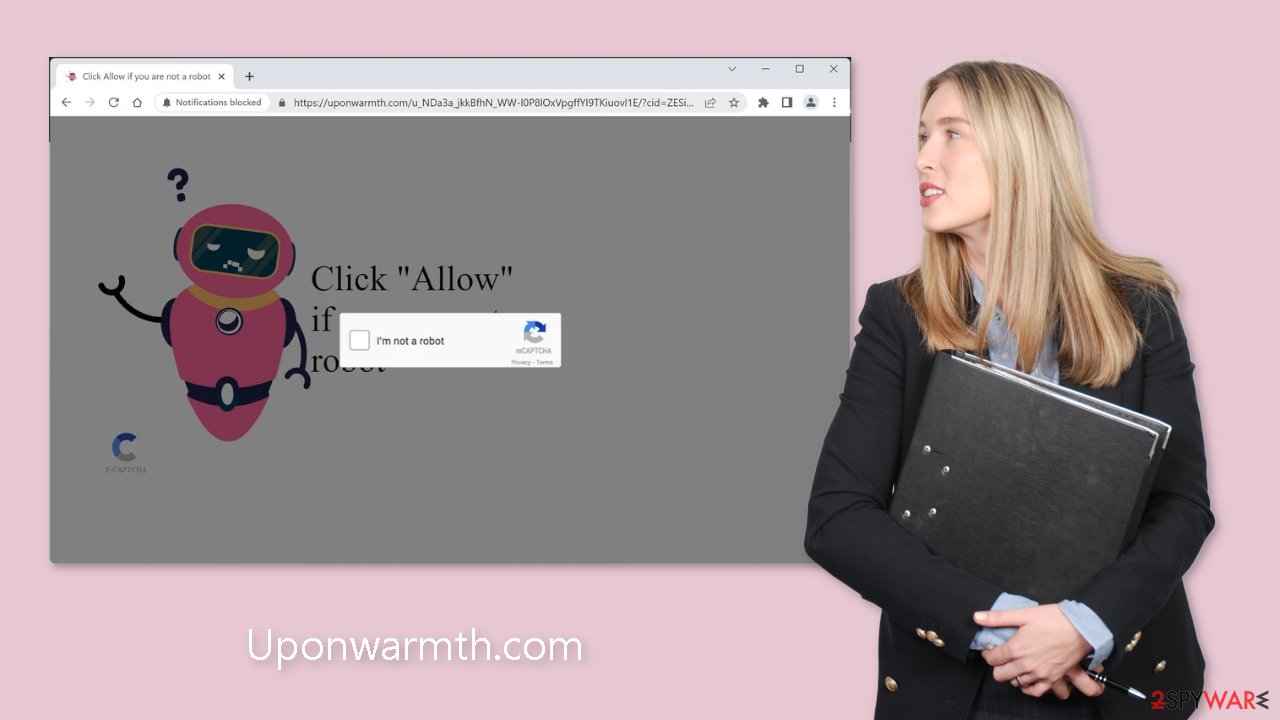
Adware removal
If you are still experiencing symptoms such as an increase in commercial content, banners, surveys, or redirects after attempting the previous removal method, your device may be infected with adware. These programs frequently infiltrate systems as part of freeware distribution sites' bundled software.
To avoid this, always use the “Custom” or “Advanced” installation methods, carefully read the Privacy Policy and Terms of Use, and carefully review the file list, unchecking any boxes next to unrelated files.
If you are uncertain which app is responsible for these activities, professional security software like SpyHunter 5Combo Cleaner or Malwarebytes can be deployed to perform a full system scan and eliminate the adware automatically. Additionally, they can prevent future infections by issuing warnings. Alternatively, if you prefer to do it yourself, step-by-step instructions for Windows and macOS are provided below:
Windows 10/8:
- Enter Control Panel into Windows search box and hit Enter or click on the search result.
- Under Programs, select Uninstall a program.
![Uninstall from Windows 1 Uninstall from Windows 1]()
- From the list, find the entry of the suspicious program.
- Right-click on the application and select Uninstall.
- If User Account Control shows up, click Yes.
- Wait till uninstallation process is complete and click OK.
![Uninstall from Windows 2 Uninstall from Windows 2]()
Windows 7/XP:
- Click on Windows Start > Control Panel located on the right pane (if you are Windows XP user, click on Add/Remove Programs).
- In Control Panel, select Programs > Uninstall a program.
![Uninstall from Windows 7/XP Uninstall from Windows 7/XP]()
- Pick the unwanted application by clicking on it once.
- At the top, click Uninstall/Change.
- In the confirmation prompt, pick Yes.
- Click OK once the removal process is finished.
macOS:
- From the menu bar, select Go > Applications.
- In the Applications folder, look for all related entries.
- Click on the app and drag it to Trash (or right-click and pick Move to Trash)
![Uninstall from Mac 1 Uninstall from Mac 1]()
To fully remove an unwanted app, you need to access Application Support, LaunchAgents, and LaunchDaemons folders and delete relevant files:
- Select Go > Go to Folder.
- Enter /Library/Application Support and click Go or press Enter.
- In the Application Support folder, look for any dubious entries and then delete them.
- Now enter /Library/LaunchAgents and /Library/LaunchDaemons folders the same way and terminate all the related .plist files.
![Uninstall from Mac 2 Uninstall from Mac 2]()
How to prevent from getting adware
Stream videos without limitations, no matter where you are
There are multiple parties that could find out almost anything about you by checking your online activity. While this is highly unlikely, advertisers and tech companies are constantly tracking you online. The first step to privacy should be a secure browser that focuses on tracker reduction to a minimum.
Even if you employ a secure browser, you will not be able to access websites that are restricted due to local government laws or other reasons. In other words, you may not be able to stream Disney+ or US-based Netflix in some countries. To bypass these restrictions, you can employ a powerful Private Internet Access VPN, which provides dedicated servers for torrenting and streaming, not slowing you down in the process.
Data backups are important – recover your lost files
Ransomware is one of the biggest threats to personal data. Once it is executed on a machine, it launches a sophisticated encryption algorithm that locks all your files, although it does not destroy them. The most common misconception is that anti-malware software can return files to their previous states. This is not true, however, and data remains locked after the malicious payload is deleted.
While regular data backups are the only secure method to recover your files after a ransomware attack, tools such as Data Recovery Pro can also be effective and restore at least some of your lost data.
- ^ Cynthia Gonzalez. Top 8 Social Engineering Techniques and How to Prevent Them [2022]. Exabeam. Information Security.
- ^ Chris Hoffman. PUPs Explained: What is a “Potentially Unwanted Program”?. Howtogeek. Technology Magazine.
- ^ Brittni Devlin. Why Should You Avoid Illegal Streaming Sites?. Makeuseof. Tech Insights.
